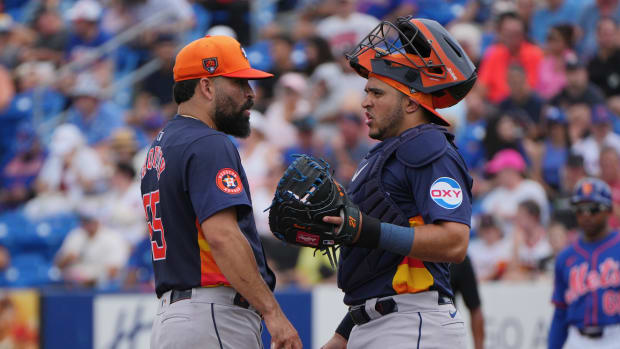The Iron Horse, Hammerin' Hank and a chemist's quest for accuracy
In 1931, Gehrig drove in 184 runs, a total that has stood as the AL record ever since. Krabbenhoft, though, thinks it should be 185. Why? Because he took it upon himself to spend the past year and a half researching every RBI Gehrig accumulated in his 2,164 career games and found one that appeared to be missing.
On May 3, 1931, Gehrig hit into what appeared to be a routine double play with runners on first and third, but Red Sox second baseman Bobby Reeves threw the ball into leftfield, allowing the Yankees' runner to score. Under the rules at the time (later changed in 1939), the batter was supposed to be credited with a run batted in, but the official scorer failed to award Gehrig the RBI. No one noticed, until Krabbenhoft pointed out the scorer's fateful omission a couple weeks ago.
It's not the first time Krabbenhoft has made such a potentially historic claim. Last year, he discovered a scorekeeping error that denied Detroit Tigers legend Hank Greenberg of an RBI in 1937. Greenberg finished that season with 183 RBIs, one short of Gehrig's established mark, but Krabbenhoft's research would have elevated Greenberg's total to 184, thus tying him with the Iron Horse.
SABR and Retrosheet.org, a database featuring play-by-pay of thousands of old games, have accepted Krabbenhoft's findings; several other outlets, including Baseball-Reference.com, Stats LLC and, most significantly, the Elias Sports Bureau, which compiles official statistics for MLB, have not. All three continue to list Gehrig's total as 184 and Greenberg's as 183.
"The presentation I saw from Mr. Krabbenhoft was suggestive but not conclusive," says Steve Hirdt, Elias executive vice president.
Elias and MLB have accepted changes in the past, perhaps most famously granting the Chicago Cubs' Hack Wilson an extra RBI for 1930 that raised his MLB single-season record to 191. They also changed Babe Ruth's career total of bases on balls from 2,056 to 2,062 (now third-most). They replaced Ted Williams, who held the record of most consecutive times reaching base safely (16), with Frank Ward, when researchers discovered Ward reached safely 17 times in 1893. Elias and MLB have even changed Gehrig's single-season RBI totals for 1927, 1928 and 1930, in part based on Krabbenhoft's prior research.
But Elias balked at updating Greenberg's total, and Krabbenhoft thinks he knows why. "They do not want changes, especially in significant records involving icons like Gehrig," he says.
Hirdt rejects that claim, and maintains that the data Krabbenhoft presented on Greenberg last year was simply not sufficient to warrant rewriting the record books. "We're not in the icon-protecting business," Hirdt says. "We're in the accuracy business. If we see evidence that rises to the level that convinces us to make historical changes, we will."
Krabbenhoft first became interested in the matter after reading on a SABR listserv in January 2011 that Manny Ramirez and Alex Rodriguez were closing in on Gehrig's career RBI total. Krabbenhoft, a lifelong Tigers fan who is originally from the Detroit area, had already been researching Tigers RBI and runs scored totals, including Greenberg's, so he then began looking into Gehrig's numbers. Krabbenhoft delivered his research on Gehrig's RBI totals from 1931-1939 to Elias last week, and Hirdt said his bureau will review it.
Trent McCotter, another SABR member who had previously researched Gehrig's career RBI totals, including the 1931 season, and has reviewed Krabbenhoft's research on Greenberg, believes that both Hall of Famers probably had an extra RBI but is not certain that the findings meet the threshold required to rewrite the record books. He notes that in both instances there's a "preponderance of evidence" in favor of making the change, but the absence of an actual play-by-play account in Greenberg's case makes it fall short of convincing the jury. "Herm's probably right that he had an extra RBI, but if you're going to change it -- put it in the record books forever -- it's probably not enough to do so based on circumstantial evidence," McCotter says. "For a record as significant as this, I want the newspaper account."
In Gehrig's case, Krabbenhoft did find a play by play account in the New York American of the May 3 game when the second baseman's error resulted in a run scoring. McCotter had come across the situation in his research, but considered it a decision at the scorer's discretion, so did not review it as thoroughly. "I figured I'd leave a play like that as it is," McCotter says. "But Herm has been probably the most thorough researcher on these types of plays that SABR has."
In total, Krabbenhoft found 48 RBI errors in the daily logs over Gehrig's career. In the Iron Horse's record-setting 1931 season, Krabbenhoft found six mistakes. Five of them were mixups that had already been uncovered, such as the April 21 game when Babe Ruth was credited for one of Gehrig's RBIs or the April 22 game when Gehrig was mistakenly given one of Tony Lazzeri's RBIs. Those five mistakes involving eight RBIs actually canceled each other out; the tipping point was Krabbenhoft's uncovering of the scorekeeper's error in the May 3 game. Moreover, the sum of Krabbenhoft's research puts Gehrig's career RBI total at 1,995, one more than Elias and the official MLB record book list (incidentally, if Gehrig is credited with the extra RBI in question he would then tie Barry Bonds for fourth place on the alltime list).
Hirdt bristles at the suggestion that Krabbenhoft's latest research on Gehrig will make it easier to change both Greenberg's and Gehrig's single-season totals for their high-water mark seasons. "Would we be more likely to accept Hank Greenberg's 184 if it did not tie Lou Gehrig's single-season record?" Hirdt says. "Absolutely not. One would have nothing to do with the other. We're trying to correct bookkeeping mistakes, not to determine who holds what record."
There is no timetable for a decision from Elias on Krabbenhoft's Gehrig claim, but for a sport that cherishes its records, statistics and icons like no other, it's a matter that fans can count on being resolved soon.



































